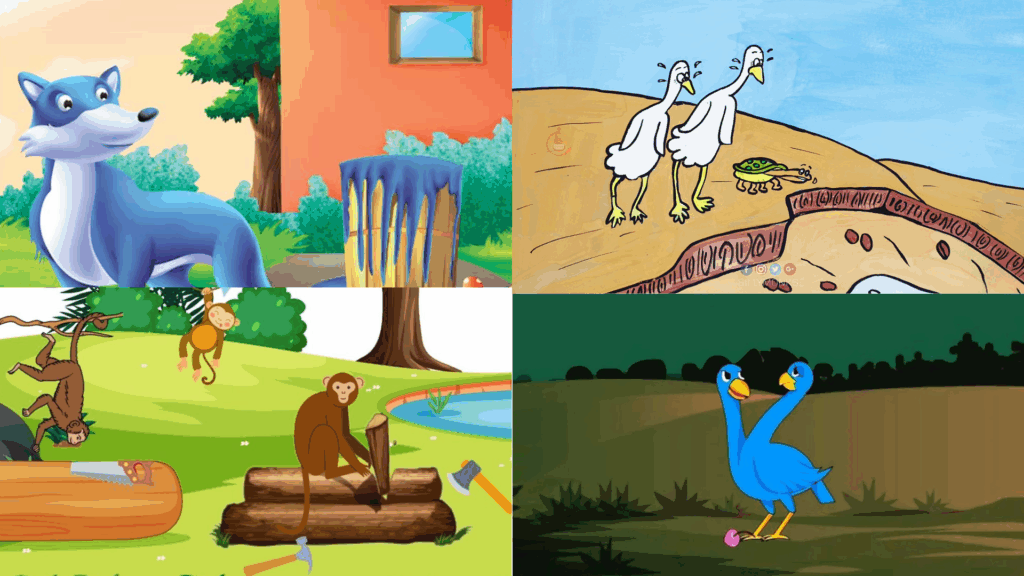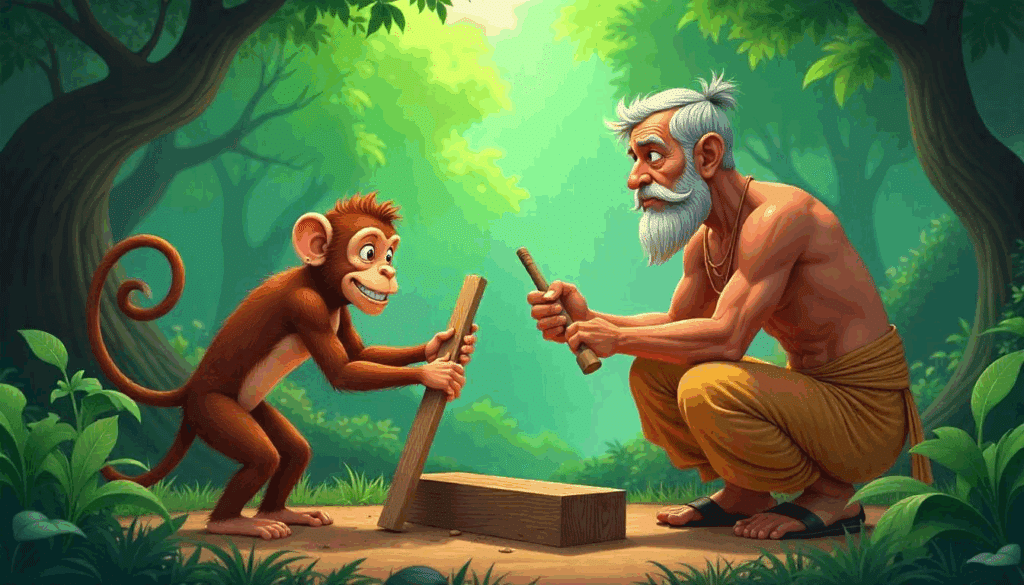Looking for timeless tales that both teach and entertain? Panchatantra stories for kids have been delighting
Panchatantra stories for kids have taught valuable life lessons for over 2,000 years. These ancient Indian fables use talking animals to make learning fun and memorable for children of all ages.
This collection features the most beloved panchatantra stories for kids that still resonate today.
These timeless tales, like “The Monkey and the Crocodile” and “The Blue Jackal,” entertain while quietly building the character and wisdom that children carry into adulthood.
Top Panchatantra Stories to Teach Kids Valuable Lessons

1. The Blue Jackal
A hungry jackal fell into a vat of blue dye while escaping village dogs.
When he returned to the forest, his unusual color startled the animals. The jackal claimed he was sent by the gods to rule them. The animals believed him and accepted him as king.
The blue jackal appointed powerful animals as ministers while keeping fellow jackals away to avoid being recognized. He enjoyed his royal life until one evening, hearing other jackals howling, he couldn’t resist joining them.
The distinctive howl revealed his true identity. Realizing they’d been tricked, the angry animals attacked and killed the jackal.
Moral: True nature always reveals itself. No matter how convincing your disguise, your real identity will eventually show. This timeless lesson teaches children that honesty matters more than temporary power or status gained through deception.
2. The Brahmin and the Mongoose
A poor Brahmin family had a baby boy and a loyal pet mongoose. One day, the mother went to fetch water, leaving the father to watch their baby. The father, remembering an errand, also left, with the mongoose guarding the baby.
While both parents were away, a deadly snake entered the house. The mongoose fought and killed the snake, getting blood on its mouth and paws.
When the mother returned and saw the blood-covered mongoose near the cradle, she immediately assumed it had attacked her baby. She killed the mongoose with a water pot.
Only then did she look in the cradle to find her baby safe and the dead snake nearby. She realized her terrible mistake – the mongoose had saved her child, and she had killed their loyal protector without checking the facts.
Moral: Look before you leap. Hasty decisions based on appearances often lead to regret. This powerful story reminds us to gather all facts before taking irreversible actions, especially when emotions are running high.
3. The Turtle that Fell Off the Stick
Two swans befriended a turtle living in a drying lake.
To save him, they devised a plan: they would hold a stick in their beaks while the turtle gripped the middle with his mouth. Before departing, they warned, “Don’t open your mouth during flight.”
As they flew over a village, people pointed and exclaimed at the unusual sight. Some children laughed at the strange spectacle.
Unable to tolerate the ridicule, the turtle forgot the warning and opened his mouth to scold the onlookers. He immediately lost his grip, fell to the ground, and died.
Moral: Controlling your tongue prevents disaster. The turtle’s inability to remain silent when provoked cost him his life. Sometimes enduring momentary ridicule is the price of survival.
4. The Monkey and the Wedge
Carpenters were building a temple and left for lunch with a log partially split, held open by a wooden wedge. A curious monkey finded the wedge and began pulling at it, fascinated by how it was stuck in the log.
Despite having no understanding of its purpose, the monkey kept tugging until he finally yanked the wedge free.
His tail was dangling between the split log, and when the wedge came out, the log snapped shut, trapping his tail.
The monkey’s painful cries echoed through the garden, but he couldn’t free himself and suffered the consequences of his meddling.
Moral: Curiosity without caution brings disaster. Don’t interfere with what you don’t understand. Some systems exist for good reasons—respect their purpose.
5. The Tale of Two Snakes
A deadly cobra envied a harmless water snake’s friendly relationship with humans. The water snake often visited a village pond where children played with him safely.
Wanting similar treatment, the cobra entered the village and approached some playing children. They immediately screamed in terror. A villager struck the cobra with a stick, seriously injuring him before he escaped.
The wounded cobra complained to the water snake about the different treatment. The water snake explained, “I’m harmless, so humans play with me. You’re venomous and dangerous, so they fear and attack you. You can’t change your nature or expect treatment meant for others.”
Moral: You’re treated according to your nature, not your desires. Attempting to receive treatment meant for those fundamentally different from yourself leads to disaster. Accept who you truly are.
6. The Wedding of the Mouse
A sage rescued a baby mouse dropped by a hawk and changeed her into a human girl. When she reached marriageable age, the sage sought the most powerful husband for her.
He approached the sun first. The sun directed him to the cloud that could cover him. The cloud suggested the wind that could push clouds away. The wind recommended the mountain that could block wind. The mountain pointed to mice that could tunnel through even the mightiest peaks.
Recognizing that his daughter’s true nature was surfacing, the sage changeed her back into a mouse and found her a suitable mouse husband. She lived happily ever after in her original form.
Moral: Your true self always emerges. Despite external changes, inner nature eventually reasserts itself. Happiness comes from embracing your authentic identity rather than pretending to be something you’re not.
7. Tale of the Golden Droppings
A poor weaver rescued and healed an injured bird, finding it produced golden droppings each morning. He collected these, sold them, and gradually became wealthy.
A merchant learned the bird’s secret and offered an enormous sum to purchase it. Initially refusing, the greedy weaver eventually calculated that a large immediate payment might be better than waiting for daily droppings.
After selling the bird, the weaver lost his reliable income source.
Meanwhile, away from the kind weaver who had saved its life, the bird stopped producing golden droppings entirely. The merchant received nothing for his investment.
Moral: Steady fortune outweighs immediate gain. Abandoning reliable ongoing prosperity for a quick windfall often leaves you with nothing. Appreciate and protect consistent sources of good fortune.
8. The Bird with Two Heads
Bharunda was a bird with two heads sharing one body.
Though they shared a stomach, each head could think and eat independently.
One day, the first head ate a delicious fruit. The second head grew jealous, complaining about unfair enjoyment. The first head reasoned that since they shared the same body, both benefited from whatever either consumed.
Later, the second head found a poisonous fruit. Despite the first head’s urgent warnings about their shared fate, the second head ate it out of spite, declaring, “Since you enjoyed your fruit alone, I’ll enjoy this one myself.”
The poison spread through their single body, killing both heads together.
Moral: Self-destructive spite hurts everyone connected. Internal conflict destroys the whole. When parts of the same system work against each other, the entire entity suffers.
9. The Unforgiving Monkey
A monkey who lived in a fruit tree befriended a crocodile by sharing sweet fruits. The crocodile’s wife, after tasting these fruits, believed the monkey’s heart must be exceptionally delicious from eating such sweetness daily. She demanded her husband bring her the monkey’s heart.
Reluctantly, the crocodile invited the monkey home, offering to carry him across the river.
Midway, he confessed his true intentions. The quick-thinking monkey replied, “I would gladly give you my heart, but I left it hanging on my tree. Let’s return so I can get it.”
The foolish crocodile turned back. Once ashore, the monkey jumped to safety and declared their friendship permanently over, never trusting the crocodile again.
Moral: Broken trust cannot be restored. Once someone reveals their willingness to harm you, the relationship is irreparably damaged. True betrayal merits permanent boundaries.
10. Elephants and King of Mice
During a drought, a herd of elephants journeying to a distant lake trampled through a field of mice holes, killing many mice unintentionally. The king of mice approached the elephant leader, requesting they take a different route.
The compassionate elephant king agreed, redirecting his herd. The grateful mouse king promised future help if needed, an offer the elephant king accepted politely while doubting its practicality.
Years later, royal hunters captured many elephants including their king, binding them with strong ropes. Remembering the promise, the elephant king trumpeted for help.
Thousands of mice responded, gnawing through the ropes until all elephants were freed. The mighty elephant king acknowledged that strength comes in many forms, and size doesn’t determine one’s ability to help others.
Moral: Power exists in unexpected places. Even the seemingly insignificant can provide crucial aid when properly motivated. Compassion toward the weak often returns as assistance when you most need it.
11. The Brahmin’s Dream
A poor Brahmin named Swabhavakripna lived in a small hut. He begged for food and stored extra portions in a pot hanging above his bed.
One night, gazing at his nearly full pot, he began to daydream: “If famine comes, I’ll sell this flour at high prices. With the profit, I’ll buy two goats, which will multiply.
I’ll sell them for cows, then build a large house and marry a rich, beautiful woman. We’ll have a son named Somasarman. When he’s playing and I’m working, my wife won’t control him properly. I’ll become angry and kick her!”
Caught up in his fantasy, the Brahmin actually kicked out, striking the pot above his bed. It shattered, spilling all the flour over him—instantly destroying both his food stores and his elaborate dreams of wealth.
Moral: Dreams aren’t reality. Building elaborate fantasies on fragile foundations leads to disappointment. Focus on present actions rather than imaginary future riches
12. The Cave that Talked
During a drought, a starving lion finded a cave that might contain prey. Unable to see inside, he devised a trick. Standing outside, he called, “Hello cave! May I come in?” After silence, he called again, “Cave, you always welcome me. Why are you quiet today?”
The lion then answered himself loudly, “Welcome, lion! Please enter.”
A jackal living inside the cave overheard this strange exchange. Curious but wary, he peeked out to investigate. When the lion spotted him and pounced, the alert jackal quickly retreated through a narrow passage where the lion couldn’t follow.
The lion waited for hours, but the jackal stayed safely hidden until the predator eventually left hungry.
Moral: Alertness defeats deception. Recognizing suspicious behavior reveals hidden dangers. The jackal survived because he investigated the strange situation carefully before fully exposing himself.
13. Frogs that Rode a Snake
An aging snake struggling to hunt positioned himself near a pond where frogs lived. He announced to the frogs, “I’ve taken a sacred vow never to harm creatures again. As penance for my past sins, I’m offering free rides to frogs.”
The skeptical frog king tested this claim by riding on the snake’s back around the pond. When he returned safely, he declared the snake trustworthy. Soon many frogs were enjoying rides across the water.
Each day, the snake would secretly eat one passenger, explaining to the others that the missing frog had simply jumped off early. The frog population steadily decreased without anyone noticing the pattern.
Eventually, a wise old frog grew suspicious and advised counting frogs before and after rides. When they finded the deception, it was too late—most frogs, including their king, had already become the snake’s meals.
Moral: Enemies rarely change their nature. Beware of convenient changeations in known predators. This cautionary tale shows how accepting an enemy’s supposed reformation without proper verification leads to disaster. Natural instincts ultimately prevail over convenient promises.
More Stories from the Panchatantra to Read

While you’re already familiar with popular tales like “The Monkey and the Crocodile” and “The Blue Jackal,” the Panchatantra contains many lesser-known gems that are equally valuable and engaging.
Here are some interesting panchatantra stories for kids worth reading:
14. Elephants and Hares
15. The Cunning Mediator
16. The Brahmin and the Crooks
17. The Dove and the Hunter
18. The Brahmin and the Cobra
19. The Old Man, Young Wife and Thief
20. The Brahmin, Thief, and Demon
21. The Four Treasure-Seekers
22. The Lion that Sprang to Life
23. The Four Learned Fools
24. The Tale of Two Fishes and a Frog
25. Fighting Goats and the Jackal
26. The War of Crows and Owls
27. The Story of the Potter
28. Lioness and the Young Jackal
29. The Donkey and the Washerman
30. The Price of Indiscretion
Conclusion
These ancient stories have endured for thousands of years because they teach life’s most important lessons in the most memorable way.
Through talking animals and surprising plots, children absorb wisdom about honesty, patience, and good judgment without feeling lectured.
Share these tales during bedtime or quiet moments, then discuss the morals together. You’ll strengthen both your bond and your child’s character development.
Which story will become your child’s favorite? The answer might reveal what values resonate most with their developing character.




